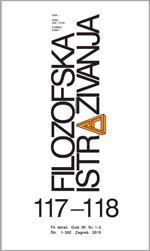Razlika Aristotelovih i Akvinčevih metafizičkih počela
Difference between Aristotle’s and Thomas Aquinas’ Metaphysical Principles
Author(s): Hrvoje ReljaSubject(s): Philosophy
Published by: Hrvatsko Filozofsko Društvo
Keywords: metaphysics; Aristotle; Thomas Aquinas; metaphysical principles; Unmoved Mover
Summary/Abstract: In this article the similarities and differences of Aristotle’s and Thomas Aquinas’ metaphysical principles are set forth by analyzing the core arguments of their metaphysics: principally, those concerning the existence of the Unmoved Mover, also called Pure Act. The analysis shows that although their arguments have the same logical structure and the same starting point – the fact that beings change – different conceptions of the metaphysical principles of being nevertheless lead to different conclusions. Therefore, this article shows that within Aristotle’s metaphysics of substance, the ultimate actuality is the substantial form which has its last ground in Pure Act, the Unmoved Mover. On the other hand, Thomas Aquinas believes that the ultimate actuality is existence, which also has its last ground in Pure Act, but the Act of Existence, or Subsistent Existence. Therefore, Aristotle’s Pure Act is a mere giver of forms and the final cause of reality. This Pure Act does not have, nor it can have any other causal influence on the rest of reality, while Aquinas’ Unmoved Mover is necessarily the Pure Act of Existence whose activity we call creation.
Journal: Filozofska istraživanja
- Issue Year: 30/2010
- Issue No: 01-02
- Page Range: 5-15
- Page Count: 11
- Language: Croatian

